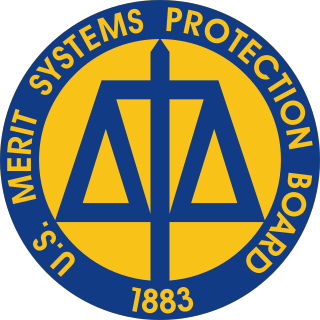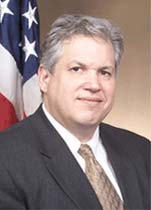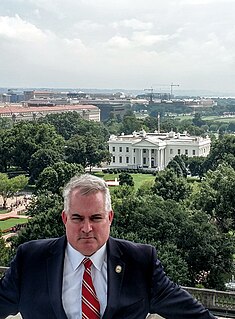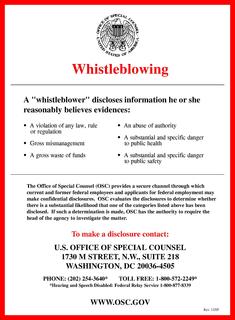Related Research Articles
A whistleblower is a person, often an employee, who reveals information about activity within a private or public organization that is deemed illegal, immoral, illicit, unsafe or fraudulent. Whistleblowers can use a variety of internal or external channels to communicate information or allegations. Over 83% of whistleblowers report internally to a supervisor, human resources, compliance, or a neutral third party within the company, hoping that the company will address and correct the issues. A whistleblower can also bring allegations to light by communicating with external entities, such as the media, government, or law enforcement. Whistleblowing can occur in either the private sector or the public sector.

The U.S. Securities and Exchange Commission (SEC) is an independent agency of the United States federal government, created in the aftermath of the Wall Street Crash of 1929. The primary purpose of the SEC is to enforce the law against market manipulation.

United States Customs and Border Protection (CBP) is the largest federal law enforcement agency of the United States Department of Homeland Security, and is the country's primary border control organization. It is charged with regulating and facilitating international trade, collecting import duties, and enforcing U.S. regulations, including trade, customs, and immigration. CBP is one of the largest law enforcement agencies in the United States. It has a workforce of more than 45,600 sworn federal agents and officers. It is headquartered in Washington, D.C.

The U.S. Equal Employment Opportunity Commission (EEOC) is a federal agency that was established via the Civil Rights Act of 1964 to administer and enforce civil rights laws against workplace discrimination. The EEOC investigates discrimination complaints based on an individual's race, color, national origin, religion, sex, age, disability, genetic information, and retaliation for reporting, participating in, and/or opposing a discriminatory practice.

The Federal Mediation and Conciliation Service (FMCS), founded in 1947, is an independent agency of the United States government, and the nation's largest public agency for dispute resolution and conflict management, providing mediation services and related conflict prevention and resolution services in the private, public, and federal sectors. FMCS is tasked with mediating labor disputes around the country; it provides training and relationship development programs for management and unions as part of its role in promoting labor-management peace and cooperation. The Agency also provides mediation, conflict prevention, and conflict management services outside the labor context for federal agencies and the programs they operate. The FMCS headquarters is located in Washington, D.C. with other offices across the country.

The United States Office of Special Counsel (OSC) is a permanent independent federal investigative and prosecutorial agency whose basic legislative authority comes from four federal statutes: the Civil Service Reform Act, the Whistleblower Protection Act, the Hatch Act, and the Uniformed Services Employment and Reemployment Rights Act (USERRA). OSC's primary mission is the safeguarding of the merit system in federal employment by protecting employees and applicants from prohibited personnel practices (PPPs), especially reprisal for "whistleblowing." The agency also operates a secure channel for federal whistleblower disclosures of violations of law, rule, or regulation; gross mismanagement; gross waste of funds; abuse of authority; and substantial and specific danger to public health and safety. In addition, OSC issues advice on the Hatch Act and enforces its restrictions on partisan political activity by government employees. Finally, OSC protects the civilian employment and reemployment rights of military service members under USERRA. OSC has around 120 staff, and the Special Counsel is an ex officio member of Council of Inspectors General on Integrity and Efficiency (CIGIE), an association of inspectors general charged with the regulation of good governance within the federal government.

Russell D. Tice is a former intelligence analyst for the United States Air Force, Office of Naval Intelligence, Defense Intelligence Agency (DIA), and National Security Agency (NSA).
The processes of government procurement in the United States enable federal, state and local government bodies in the country to acquire goods, services, and interests in real property.

The Merit Systems Protection Board (MSPB) is an independent quasi-judicial agency established in 1979 to protect federal merit systems against partisan political and other prohibited personnel practices and to ensure adequate protection for federal employees against abuses by agency management.
The Surface Transportation Assistance Act of 1982 was a comprehensive transportation funding and policy act of the United States Federal Government, 96 Stat. 2097. The legislation was championed by the Reagan administration to address concerns about the surface transportation infrastructure. The Act contained Title V, known as the Highway Revenue Act of 1982, which added five cents to the per gallon gas tax, of which four cents was dedicated to restore interstate highways and bridges, and one cent for public transit. The Act also set a goal of 10 percent for participation of disadvantaged business enterprises in federal-aid projects.

Scott Bloch is an American attorney and former political appointee of President George W. Bush. Bloch served as United States Special Counsel from December 12, 2003, when Bush signed his appointment, filling out his five-year statutory term on December 11, 2008.
Cyrus S. Ching was a Canadian-American who became an American industrialist, federal civil servant, and noted labor union mediator. He was the first director of the Federal Mediation and Conciliation Service (FMCS) and the Wage Stabilization Board.

The Oklahoma Merit Protection Commission (OMPC) is an independent quasi-judicial agency of the government of Oklahoma established to protect the integrity of state’s merit system utilized by state agencies and their employees. The Commission and the Office of Personnel Management act independently forming a “checks and balances” method of managing the merit system.

Wilma B. Liebman is an American lawyer and civil servant who is best known for serving as a Member of the National Labor Relations Board (NLRB). She was designated Chair of the Board by President Barack Obama on January 20, 2009, becoming only the second woman to lead the NLRB.

The Department of Defense Whistleblower Program in the United States is a whistleblower protection program within the U.S. Department of Defense (DoD) whereby DoD personnel are trained on whistleblower rights. The Inspector General's commitment fulfills, in part, the federal mandate to protect whistleblowers. It also administers the Defense Intelligence Community Whistleblower Protection Program (DICWP), as a sub-mission for the intelligence community. The Inspector General's Defense Criminal Investigative Service also conducts criminal investigations which rely, in part, on Qui Tam relators.

Daniel P. Meyer is an attorney admitted in the District of Columbia and is currently the Managing Partner of the Washington D.C. Office of Tully Rinckey, PLLC, an international law firm headquartered at Albany, New York, and co-founded by Mathew Tully and Greg Rinckey.
Live Action is an American nonprofit anti-abortion organization. Lila Rose founded and leads the group. Live Action is known for its undercover videos taken at Planned Parenthood clinics.
Waters v. Churchill, 511 U.S. 661 (1994), is a United States Supreme Court case concerning the First Amendment rights of public employees in the workplace. By a 7–2 margin the justices held that it was not necessary to determine what a nurse at a public hospital had actually said while criticizing a supervisor's staffing practices to coworkers, as long as the hospital had formed a reasonable belief as to the content of her remarks and reasonably believed that they could be disruptive to its operations. They vacated a Seventh Circuit Court of Appeals ruling in her favor, and ordered the case remanded to district court to determine instead if the nurse had been fired for the speech or other reasons, per the Court's ruling two decades prior in Mt. Healthy City School District Board of Education v. Doyle.

A whistleblower is a person who exposes any kind of information or activity that is deemed illegal, unethical, or not correct within an organization that is either private or public. The Whistleblower Protection Act was made into federal law in the United States in 1989.
Shahid Imran Awan is a Pakistani-American information technology worker. From 2004 to 2017, he worked as a shared employee for Democrats in the U.S. House of Representatives.
References
- 1 2 3 Greenhouse, Steven (October 20, 2011). "Mediator in N.B.A. Talks Has Strong Sports Pedigree". The New York Times . p. B12. Archived from the original on June 7, 2022. Retrieved February 27, 2017.
- 1 2 Rosiak, Luke. "Bureaucrats at tiny federal agency FMCS buy legions of luxuries with purchase cards", The Washington Examiner , October 1, 2013. Accessed September 13, 2016.
- ↑ Rosiak, Luke. "Head of scandal-plagued FMCS to resign following Washington Examiner series", The Washington Examiner , November 26, 2013. Accessed September 13, 2016.